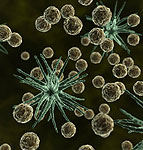 Part two of the article series on your immune system focuses in on changes that can occur as we age. It’s important to know what can happen, and what can further weaken your immune system. Let’s get to it.
Part two of the article series on your immune system focuses in on changes that can occur as we age. It’s important to know what can happen, and what can further weaken your immune system. Let’s get to it.
First off, bone marrow is the origin of all the cells of the immune system. These cells circulate in the bloodstream and organize themselves into organs, such as the thymus, spleen, and lymph nodes.
As you get older, there is a gradual decline in the immune system in the following ways.
1. There are fewer antibodies produced when a foreign substance comes. This might account for the age-related increase in the incidence of influenza and pneumonia. Also, it might explain why most vaccines are less effective in the elderly.
2. The body produces fewer lymphocytes in response to antigen challenge.
3. The T cells in the body respond more slowly to a threat.
4. The immune system is less capable of telling the difference between what belongs to your body and what’s a substance that’s foreign to your body. This might explain why autoimmune diseases are more common in older adults.
5. Macrophages (type of white blood cell) tend to destroy new antigens, bacteria, or cancer cells more slowly. This might account for the increased incidence of cancer in older individuals.
6. The thymus gland, a major organ that makes lymphocytes, shrinks with age. This is a major contributing factor to the age-related decline of your immune system.
There are many factors that could adversely affect your immune system, thus making you more prone to infections.
These factors include:
— Medications: Antibiotics; antacids; anti-inflammatory drugs such as aspirin; “Tylenol;” “Motrin;” steroids; immunosuppressants; chemotherapy; radiation treatment
— Allergies: Asthma; hay fever; mold; eczema
— Diet-related factors: High intake of trans fats, refined sugars or saturated fats; fake fats such as “olestra;” reduced intake of foods rich in antioxidants
— Stress, physical or emotional
— Alcohol or drug abuse
— Smoking or exposure to secondhand smoke
— Chronic exposure to allergens from chemicals, pollutants or foods
— Sleep deprivation
— Physical inactivity
— Cancer, especially of the immune system (e.g. leukemia, lymphoma)
— Autoimmune diseases, such as rheumatoid arthritis, lupus, multiple sclerosis
— Immunodeficiency disorders such as AIDS
